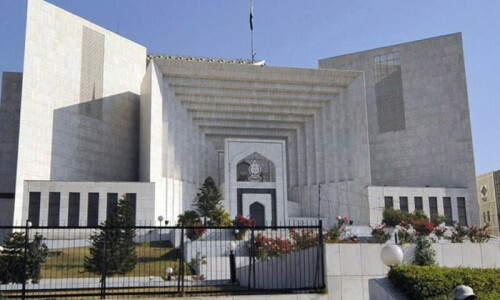HYDERABAD, Nov 26: Academics and research scholars on Wednesday called for implementing a national programme for free and compulsory primary education to bring about universal literacy and strengthen school education.
Speaking at the two-day National Conference on Education organised by the Faculty of Education of the University of Sindh at Elsa Kazi campus in collaboration with Higher Education Commission, they expressed grave concern over deterioration of quality of primary education in the country, particularly in Sindh.
Dr N.A. Baloch, who opened the conference, said that the most serious drawback of the present educational system was its neglect of school education.
He said that the provinces had not been encouraged and financed adequately to improve school education or bring all the children to schools.
He emphasised the need for implementing a national program for free and compulsory primary education to achieve universal literacy and strengthen school education.
Dr Saeeda Shah of the University of Leicester UK said in her paper on girls’ education in rural areas that girls’ education was a global issue, which was underpinned by a myriad of factors, ranging from a genuine desire on part of family to protect and safeguard girls in specific contexts to cultural determinants, social manipulations, gender discrimination, economic priorities, religious interpretations, political exploitations, vested interests and simple pragmatics among many others.
Dr R.A. Shah, adjunct professor at Keen University USA, said that the government must put into practice the education policy prepared in 1972 and follow a universal curriculum at the primary level. An effective monitoring system should be put in place to help achieve targets of education, he added.
Prof Dr G.A. Allana said that the government should consider recommendations put forward by educationists and scholars for improving quality of education and education system in the country.
Prof Dr Mohammad Memon of Aga Khan University said that prosperity of a nation was directly linked to effectiveness of its education system. Quaid-i-Azam Mohammad Ali Jinnah had emphasised the importance of a “balanced” education system for promoting values of democracy, social justice, integrity, humility, tolerance and good citizenship.
He said that education sub-sector suffered from a lack of cohesive vision, educational ideology, evidence-based informed education policy, political will and wisdom.
The education policies were based on a weak conceptual framework and guided by bureaucratic, political and donor-driven agendas, the scholar said and added that the policies failed to make a major difference on the quality of education, giving rise to all kinds of social ills in the society.
Dr Nabi Bux Jumani of Allama Iqbal University said in his paper on “Study on the situation and problems of girls’ education in rural areas of Sindh and Punjab” that even in an era of technology in rural areas women were forced to live in stone-age.
Dr Mohammad Javed Iqbal said at present, enrolment in primary classes from I-V in the country stood at 10,971,273 while in Sindh it was 3,525,955.












































Dear visitor, the comments section is undergoing an overhaul and will return soon.